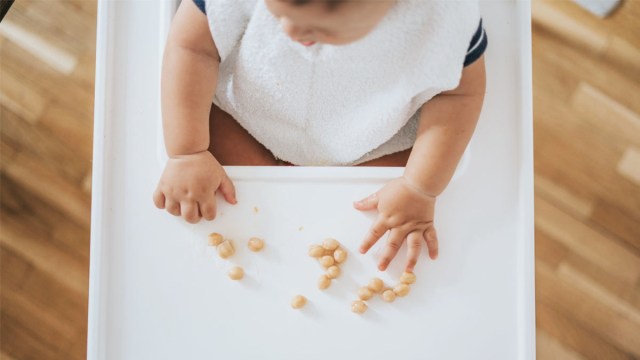As your baby gets the hang of solids, it won’t be long before they start trying to pick up bits of food with their tiny little fingers. This skill, also known as the pincer grasp, involves using the index finger and thumb to grab small pieces of food and excitedly deliver them to their waiting mouths. Your baby will usually start practicing at around 8 or 9 months, and it’s freaking adorable, with plenty of little pieces slipping and sliding out of their pudgy hands in the early days.
The pincer grasp is an important skill for eating, but also as they grow—for picking up toys, turning the pages of a book, zipping up sweaters, and using scissors, just to name a few. Like any new skill, it takes time to get it right and practice makes perfect. When they start showing signs that they’re trying to pick up little things, start cutting their food into small, bite-sized pieces. Give them plenty of opportunities to work on it throughout the day—whether you’re prepping dinner, making your second (or third!) cup of coffee, taking a snack break at the park, or during mealtime. There are plenty of foods to try, from fresh fruits and veggies to packaged options (beyond the very obvious Cheerios).
As a dietitian and mom of three, I know how overwhelming it can be to introduce your baby to food. To make things easier, I’ve rounded up my favorite finger foods that help your baby strengthen their pincer grasp:
1. Peas
Peas are a delicious and budget-friendly way to help your baby practice their pincer grasp. Toss a couple of bags of frozen peas into your shopping cart (usually less than $1 each), and you’ll have enough pincer grasping practice for dozens of meals. Just remember that small, round foods can pose a choking risk since they can get lodged in the esophagus. To reduce this risk, lightly mash the peas so that they lose their circular shape.
2. Yogurt Melts
Yogurt melts are always a fan-favorite because they’re sweet, melt in the mouth, and are fun to eat. Try to look for options that are made from real food ingredients and don’t have any added sugar. We love Amara Smoothie Melts because they fit the bill, with ingredients lists that include fruits, veggies, and coconut milk. Plus, the reusable bags are super convenient for traveling—just seal them up, pop them in the diaper bag, and you’re ready to practice the pincer grasp on the go.
3. Beans
You’ve got a ton of beans to choose from—chickpeas, black beans, kidney beans, cannellini beans, pinto beans, and more! We love beans because they’re perfect for practicing the pincer grasp and give your baby a boost of iron, a nutrient they need more of at this age. Just like peas, beans can pose a choking risk since they’re small and round, so make sure to flatten them into a disc shape or lightly mash them to keep mealtime safe.
4. Berries
Berries are another fantastic food to help your baby refine their pincer grasp, and they’re packed with fiber and antioxidants to boot. Whether you choose blueberries, blackberries, or raspberries, it’s important to modify them for safety. Cut blueberries in half or flatten them into a disc shape, quarter blackberries lengthwise, and lightly mash or flatten raspberries before serving.
5. Puffs
Puffs are a beloved snack for eager little fingers, with good reason. They’re also great for involving your baby in family snack moments. For example, when older siblings are munching on crunchy, puffy snacks like chips or cheese curls, offering age-appropriate puffs ensures that baby feels like part of the snacking crew. When you’re perusing the snack aisle, opt for baby puffs without added sugar and salt, like Little Bellies Softcorn, which is made from solid ingredients like corn meal and real fruit powders.*
Related: 6 Common Mistakes Parents Make When Starting Solids
We also love these star-shaped Once Upon a Farm puffs because they’re fun to eat and easy for tots to pick up. Plus, they keep your baby happily occupied while you take a quick five or whip up a speedy dinner before carpool. They’re unsweetened, salt-free, and made with nutritious ingredients like sorghum flour, avocado oil, fruit and vegetable powders, and coconut milk powder.
6. Shredded cheese
Shredded cheese can be a bit trickier to pick up, depending on how finely it’s shredded. Challenging your baby with different textures can help strengthen their skills. Try offering freshly shredded mozzarella or cheddar cheese. Remember, cheeses tend to be higher in sodium, so it’s a good idea to moderate how often you give them to your baby.
7. Homemade pancakes
Homemade pancakes are a family favorite because they’re nutritious and always a crowd-pleaser. Instead of serving them whole or in strips, cut them into bite-sized squares to give your baby’s pincer grasp a workout. Here’s a mom hack: we love this three-ingredient pancake recipe using banana, flour, and eggs—it’s easy to prepare and there’s less cleanup, too.
*The author has a working relationship with this brand.











